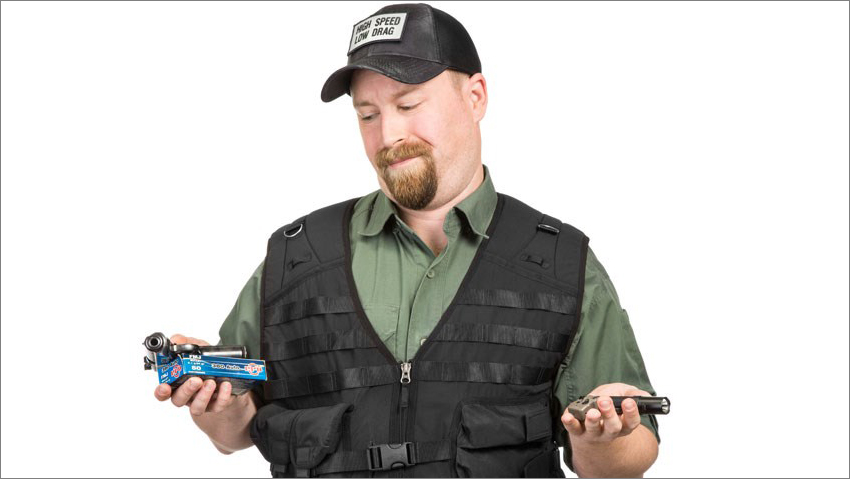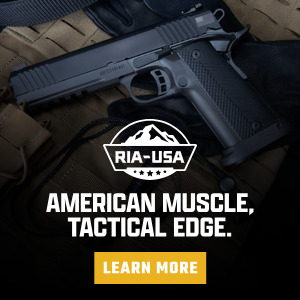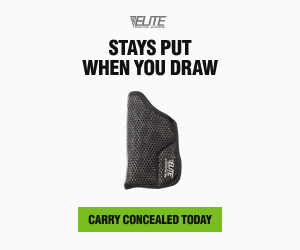Don’t believe everything you hear… Personal survival depends on planning and preparation, not opinion. Read more…
SOURCE: NRA Publications, by Tamara Keel
Here’s a thing that happens often enough that it’s become a meme, a trope, a truism. Walk into any gun store and listen to the conversation around the handgun counter (or, alternatively, belly up to your favorite online forum) and within a surprisingly short amount of time you will hear someone suggest something that gets belittled by the regulars. More importantly, it will be belittled in a rather specific way, like so:
“You want to do [RANDOM THING]? Don’t you know that [RANDOM THING] will get you killed on the streets?”
It’s to the point where “Killed on the streets” has become something of an inside joke. I’ve been trying to catalog these methods of self-induced demise, partly to debunk them, and partly in the hopes I can publish a phonebook-size compendium some day and profit handsomely. I’ll just go ahead and share some of these with y’all today, though, for free.
Carrying a revolver, for starters, will apparently get me killed on the street. This caught me off guard, because I’ve seen pictures of pre-1980s America, when revolvers were the predominant sidearm for law enforcement and private citizen alike. You’d think the streets in those pictures would be hip-deep in revolver carriers who had been killed in them, and yet they aren’t.
I mean, there’s a reason police have generally moved from revolvers, and yes, I think a quality semi-automatic pistol is capable of solving more defensive problems than a revolver, but that doesn’t magically render a revolver ineffective. There are reasons some prefer wheelguns, including simplicity and the fact that they depend on the trigger finger rather than the ammunition in order to function. For some, those factors outweigh the drawbacks, and some revolver enthusiasts shoot their guns remarkably well.
Similar to revolvers in their ability to apparently cause demise upon the public thoroughfares are reloads, or rather the lack thereof. I will say up front that, if carrying a semi-automatic pistol, then carrying a spare magazine is definitely Best Practice with a capital B and P.
This is not, however, in case the need should pop up for a 35-round exchange with ninjas in the middle of the Kwik-E-Mart parking lot. Instead, this is because the part most likely to go wrong with your pistol is the magazine. The number of ways it can go wrong are legion, and range from double-feed malfunctions to simply falling out of the gun. The quickest and surest way to fix this malfunction is to insert a fresh magazine and drive on.
However, modern pistols are exceedingly reliable devices and the belt and pocket space of the average American who can’t dress like a tactical hobo is finite. There are plenty of other things that you will use more often than a spare magazine, and if it comes down to choosing between a good flashlight or a tourniquet neatly folded onto a PHLster Flatpack TQ carrier and a spare magazine? Take the flashlight or the tourniquet. (And if you’re carrying two spare magazines and zero tourniquets? You’re wrong.) So, no, not carrying a spare magazine will probably not get you killed in the streets.
What about mechanical safeties on pistols? I hear that these will get me killed in the streets, too, because I won’t be able to deactivate them under stress. (In fact, I’m aware of one situation reported by a local detective where a citizen was victimized for exactly that reason.)
Thing is, not all safeties — nor all end users — are created equal. There are safeties which disengage vary nearly automatically with a final firing grip, and there are shooters who practice using those religiously in daily or near-daily dry-fire sessions. Then there are miserable little tabs that you practically need to manipulate with a thumbnail.
If you’re going to carry a pistol with a mechanical safety, make sure it’s one you can deactivate smoothly and automatically as part of the drawstroke, and not some fiddly thing that takes two hands and a jeweler’s screwdriver to manipulate. This should minimize the whole “killed on the streets” factor.
Another surefire killed-on-the-streets cause is carrying a caliber that the dispenser of wisdom feels is inadequate, which is usually any one “wimpier” than what they’re carrying. They’ve got a .44 Mag. and you have a .45 ACP? Killed in the streets. A .40 S&W versus your 9 mm? Likewise.
To hear some folk talk, carrying a certain caliber of handgun bestows bullet resistance to projectiles from lesser calibers. “Ha-ha! That goblin was carrying a .380 ACP, and I had my .44 Spl. …” I have bad news: Just because yours is bigger, dude, doesn’t mean the bad guy’s bullets are going to bounce off you like a spring shower off a freshly Rain-Xed windshield.
Conversely, just because you have a 9 mm or a .327 Fed. Mag. instead of some big-bore wondermagnum, it doesn’t mean that yours will bounce off him. Shot placement works, and there’s no magic chambering that will cause or prevent your getting killed in the streets.
The list goes on and on: Flashlights or lasers giving away your position? Killed in the streets. Retention devices on your holster? Killed in the streets. I could go on, but I only have so much space here. Plus, I need to save some for that big, thick book.









